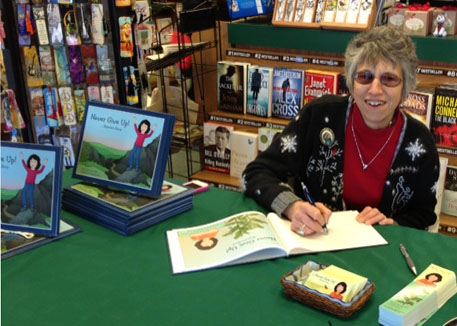Grandmother Finally Learns How to Read & Joins the College of Optometrists in Vision Development with a Special Message to Parents to “Never Give Up”
The College of Optometrists in Vision Development is pleased to welcome Beanie Leffler in helping us celebrate August as International Children’s Vision & Learning Month.

As August is wrapping up, International Children’s Vision and Learning Month is quickly coming to a close. “It is our hope the message that vision problems can interfere with one’s ability to read and learn will continue throughout the school year,” states Dr. David Damari, OD, FCOVD, President of the College of Optometrists in Vision Development.
“We know it can be tough for parents to know what to do when their children are struggling with reading,” Damari continues, “The goal for Children’s Vision & Learning Month is to help parents to understand that the first thing they need to check is whether or not their child has a vision problem.”
However, one of the biggest mistakes parents can make is to assume that their child’s vision is fine because the vision screening was passed at the pediatrician’s office or the school nurse’s office.

Beanie Leffler, now 60 years old, knows firsthand how big a mistake that is. She had passed all the vision screenings, and her parents never suspected she had a vision problem, even though she had tremendous difficulty with reading. Her first eye exam was when she was in the seventh grade, and that’s when she started wearing glasses. But even with the eye exam, a very serious eye coordination problem was missed.
“I was held back in first grade and I took every remedial class, every summer school, everything that my parents could possibly send me to,” said Leffler. “I struggled with reading all the way through high school. I wanted to be a part of the school newspaper, but because of my reading issues, all I could do for the paper was staple it.”
The saddest day of her life was when she was trying to read to her 5-year old son, Leffler said. “He looked up at me and said ‘Mom, my teacher reads better than you,’ and then he walked away from me. That was my wake-up call.”
When she was 52 she was diagnosed with severe Dyslexia and told there was nothing that could be done to help her. Yet, she did not give up in her battle to learn how to read. When she was 55 she was fortunate to see a tutor who recognized that she might have a vision problem blocking her from being able to read. She referred her to a developmental optometrist who found the eye coordination disorder that was at the root of Beanie’s struggles.
After a program of optometric vision therapy, Beanie is now not only able to read, but she has written a book with the goal of sharing her story and the important message to “never give up.” “If I help just one child, the book will be worth it,” shared Beanie. Beanie has already helped more than one child to discover that they too had underlying vision problems.

“One child was actually being teased at school, the kids were saying ‘Camryn is beautiful, but she is dumb.’ Fortunately her mother heard about my book on Facebook and decided to take her child to a developmental optometrist also.” Beanie continues, “Just last week she called me to let me know that Camryn also had a correctable eye coordination problem.”
So it is with great pride that Beanie joins the College of Optometrists in Vision Development to help spread the message that vision problems can indeed block a child’s ability to read. Beanie’s message to parents? “Please learn more about how vision problems can hold children back from achieving to their potential. Learn the signs and symptoms that will tell you if your child could have a vision problem. And most of all never give up. Even if the best experts tell you it isn’t due to vision, don’t stop searching for answers.”
“We applaud Beanie’s persistence and admire the fact that she never gave up on her goal to learn how to read,” states Damari; “We hope that Beanie’s story inspires parents to take action now and visit our website, covd.org. And also, please share this story with everyone you know who struggles with reading. It could make all the difference!”
CONTACT: Pamela R. Happ, CAE
COVD Executive Director
888.268.3770 tel
Email: phapp@covd.org
Website: www.covd.org
About COVD
The College of Optometrists in Vision Development (COVD) is an international, non-profit optometric membership organization that provides education, evaluation, and board certification programs in behavioral and developmental vision care, vision therapy, and visual rehabilitation. The organization is comprised of doctors of optometry, vision therapists and other vision specialists. For more information on learning-related vision problems, vision therapy and COVD, please visit www.covd.org or call 888.268.3770.
A series of public service announcements (PSAs) are available at covd.org to help raise awareness that vision problems can not only interfere with learning, but sports performance, and other activities of daily living. These PSAs also address vision problems that impact individuals who have autism spectrum disorders or those who have suffered a head injury.
Tags:



